When life gets out of control it’s not unusual to feel really overwhelmed – even to the point we have thoughts of suicide. But there is hope, and you are not alone.
Download our pocket guides Thinking about Suicide and Safety Planning or continue reading to find out more about thoughts of suicide.
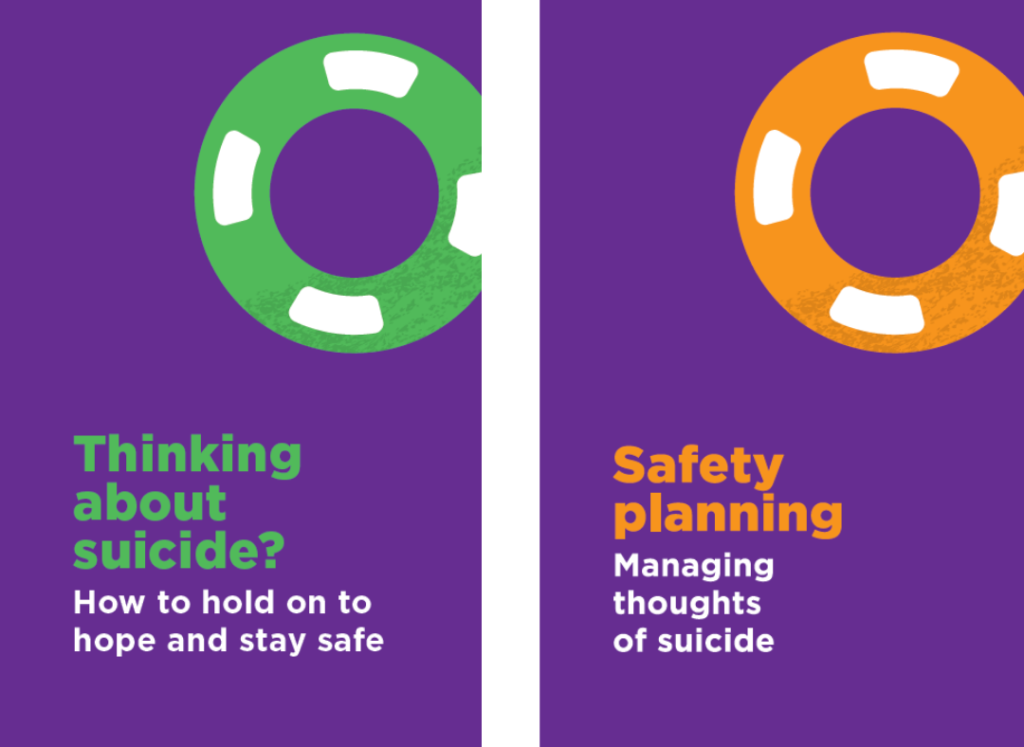
Many, many people think about suicide at some point in their lifetime, around one in five of us.
Thoughts of suicide can happen for many reasons. You may feel so low that life seems unbearable. Or you may have suffered a loss or life changing circumstances such as a relationship breakdown, loss of a job or money problems that make you feel like death is the best solution.
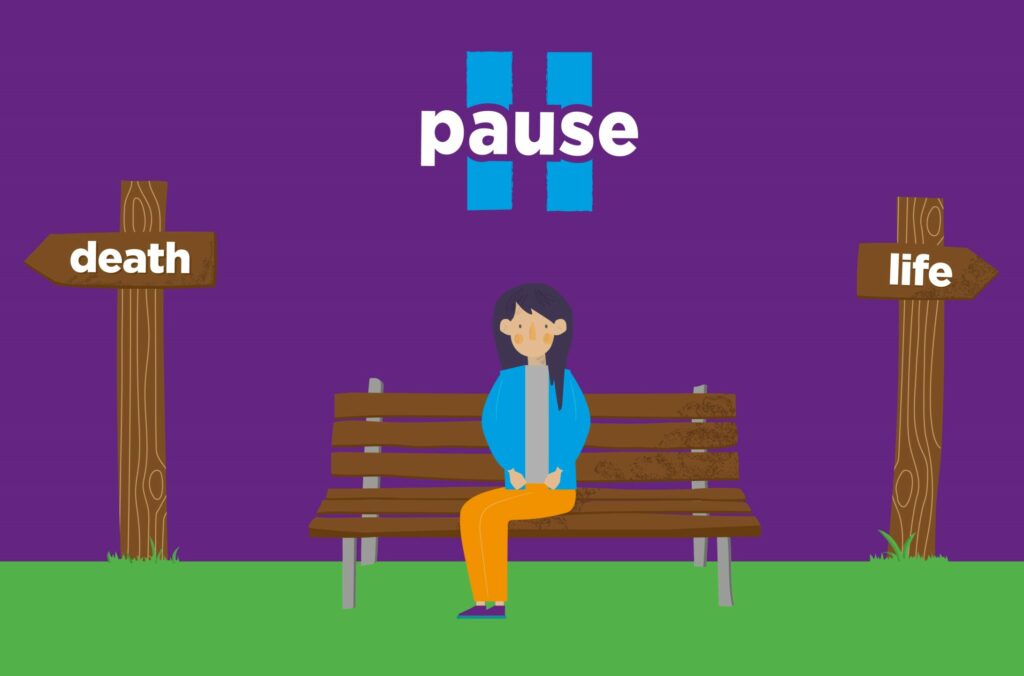
Press the Pause Button. There will be things that you and other people can do to make things better.
If you’re struggling, and not sure if you want to live or die – press the pause button – hold off making the decision for now. Suicidal thoughts aren’t permanent – things do improve – and you can find your motivation to live again. You may have reasons for dying, but you also have reasons for living.
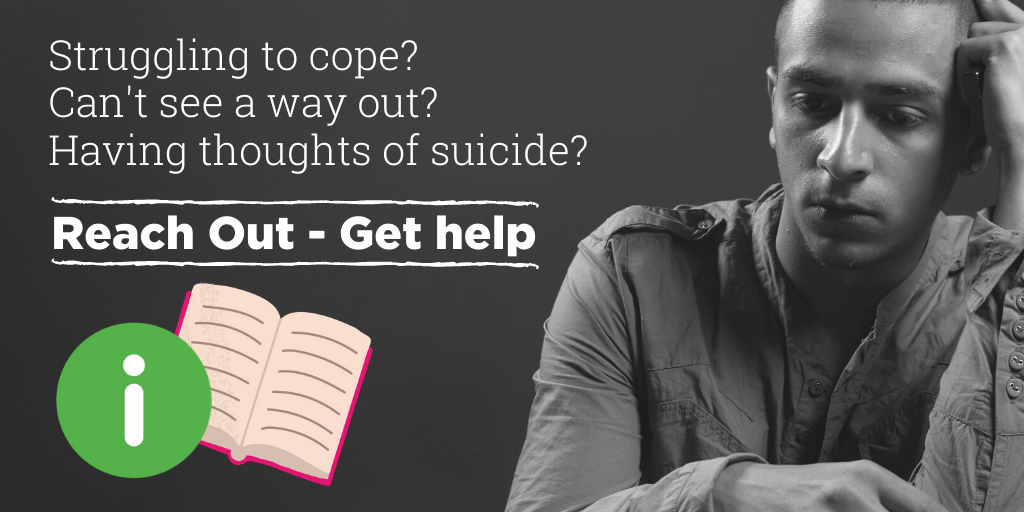
Reach out and get help. There are people who want to help you.
If you are really struggling to cope or are having thoughts of suicide then please reach out for help. It’s OK to ask for more support to see you through this difficult time. Visit our Support Directory to find out more about where you can find help.
Find out more
What are thoughts of suicide?
![]()
Experiencing thoughts of suicide can be distressing and frightening. But it’s important to remember that the vast majority of people who have thoughts of suicide do not go on to kill themselves.
Suicide means to end your own life intentionally. Anyone can experience thoughts of suicide and everyone is different; what makes suicide feel like an option to one person might be experienced very differently by someone else. And that’s okay.
Suicidal feelings can begin as fleeting thoughts of wanting to disappear or escape and can develop into being preoccupied by thoughts about ending your life and thinking about methods of suicide, or making clear plans to take your own life. You might think or feel:
hopeless, like there is no point in living
that people would be better off without you
tearful and overwhelmed by negative thoughts
unbearable pain that you can’t imagine ending
useless, unwanted or unneeded by others
desperate, as if you have no other choice
thinking about methods of suicide or planning how and when you will end your life
For some people thoughts of suicide may only happen once in relation to a particular situation, and some people may live with regular thoughts of suicide for years. Thinking about suicide does not mean that you will act on these thoughts though.
It’s important to remember though that these intense thoughts will pass. And no matter what thoughts of suicide may be like for you, there is always help available, and you don’t have to experience them alone.
Creating a Safety Plan can really help you manage these thoughts and urges.
Why do I feel suicidal?
![]()
Sometimes challenging life events can lead to thoughts of suicide – but it can also be lots of smaller things building up – everyone deals with life’s challenges differently.
We all go through tough times, whether it’s the breakdown of a relationship, losing a job, or feeling like a failure. When things happen we feel unable to cope with, or feel overwhelmed by, suicide can start to feel like an option to escape the pain.
People may feel suicidal because something has happened which feels too overwhelming for them to cope with, they may feel trapped and unable to escape from the situation. It may have been a situation that has been building up over time or be a recent event. Whatever it is it may leave the person feeling isolated and alone and believing that people would be better off without them.
Struggling to cope and having thoughts of suicide can stem from many different situations, such as:
job loss, redundancy or failure of a business
adjusting to a big change, such as retirement, pregnancy or parenthood
long-term physical pain, illnesses or mental health problems
money or housing problems
bullying and discrimination
sexual, domestic or physical abuse
bereavement or losing a loved one to suicide
relationship breakdowns or losing access to children
isolation or loneliness
being in prison
feeling inadequate or a failure, or that good things happening to others around you
addictions such as gambling, alcohol or drugs
cultural pressure, such as forced marriage, or doubts about your sexual or gender identity
Some people can say why they feel suicidal, but in other instances there may not be a clear reason, or they may be unable to talk about what they are feeling or experiencing.
Thoughts of suicide may become more intense if a person drinks alcohol, uses recreational drugs or has sleep problems.
What’s important to know is that whatever the reasons someone feels suicidal, these reasons are significant and valid.
Where can I get help?

Thinking about suicide does not make it inevitable that you are going to take your own life. There are ways to live with thoughts of suicide.
Lots of people have thoughts of suicide but the good news is that there are many people and organisations that really want to support you through this difficult time and help you to resolve whatever it is that has led you to the point of thinking about suicide. Reach out and talk.
Talking about our fears and feelings is difficult – even to those closest to us. Words are sometimes wholly inadequate to convey the amount of pain and distress a person may be going through. It is easy to understand that someone is hurting if they have been badly injured or are physically ill. Emotional pain cannot be seen, but it can be just as unbearable.
You might feel unsure of what to do, but there are lots of sources of support that might help.
Friends and Family can offer emotional and practical support and space to talk about their feelings
You can seek treatment and support from your GP or other professionals
Look for sources of advice and support that might address the problems in your life currently.
Find out about the range of Helplines and Online support forums available
Explore ideas to improve your Wellbeing and general mood.
Make a Safety Plan.
Friends and Family
Emotional support and understanding offered by family and friends can have a hugely positive effect. If people have a positive experience of opening up about their suicidal thoughts and asking for help, then many more suicides will be prevented.
Sometimes talking with friends and family about their feelings can be invaluable in helping someone feel safe and secure, and helping the thoughts of suicide pass. Some people though may need professional support to help overcome their suicidal thoughts, and the situation that has led to it.
GP’s and NHS Services
Your GP can refer you to a range of NHS mental health services including talking treatments such as CBT and Crisis support. If possible, bring someone else with you to your appointment that you trust. It helps to prepare what you want to say to your GP, and it’s very important to be open and specific about your thoughts of suicide.
Have a look at Doc Ready and Mind’s Find the Words to find out more about talking to your GP about your mental health
If thoughts of suicide are becoming more difficult to manage then you can call
North Cumbria NHS Universal Mental Health Crisis Line
0800 652 2865
South Cumbria NHS Urgent Mental Health Support Line
0800 953 0110
These are open 24 hrs a day/7 days a week and are for all ages.
Your GP may also refer you to the local NHS Crisis Team who – either for a home or hospital appointment – and this may lead to home based support for the duration of your immediate crisis.
Visit our Support Directory pages to find out more about NHS support available in Cumbria
Medication
Your GP can also prescribe medication which might help. Although there no specific drugs to treat suicidal feelings, your GP might offer you medication to help you cope with your symptoms, or to treat a mental health problem such as depression, which might be causing your suicidal feelings. Medication might include, antidepressants, antipsychotics, mood stabilisers or sleeping pills. Mind have a wide range of information about Medication here.
Other professional support
There are lots of different places someone can access help for thoughts of suicide. Have a look at our Support Directory to see some ideas of the types of services available. Alternatively, you can give one of the listed helplines a call to talk about your options for support.
Telephone/Text Helplines
There are some really helpful telephone and text helplines for people experiencing thoughts of suicide, some of which are open 24 hours a day, at times when friends and family may not be there to listen. Put their numbers in their phone. See the Telephone and Text Helplines section below or find out more on our Support Directory.
Peer Support
Many people find talking to someone who has been through the same situation as them as very supportive. Have a look at the Online Support Communities in ours Support Directory.
Safety Plan
A Safety Plan is a way of working out what might be helpful in keeping someone safe when they are having thoughts of suicide. It sets out what someone can do to help themselves and what they would do, and who might support them in a crisis. It’s also a useful way of keeping important information and contacts together in one place.
Download our Pocket Guide to Safety Planning or visit our Safety Planning page to start writing your own.
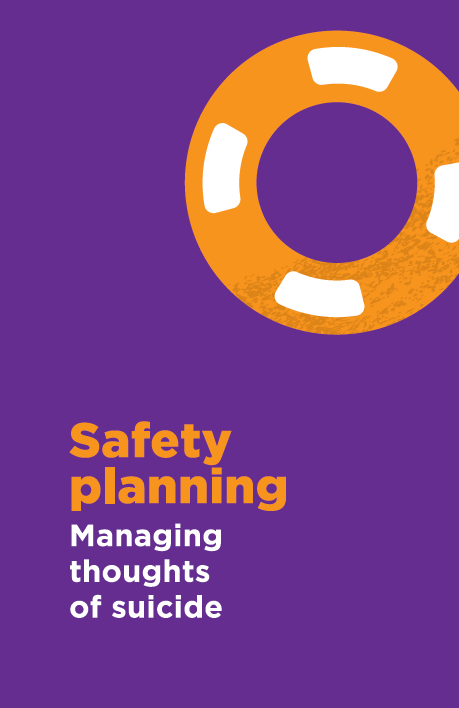
What is a Safety Plan?
![]()
A Safety Plan is a way of working out what might be helpful in keeping yourself safe. Thoughts of suicide do pass and being prepared to manage them can make all the difference.
A Safety Plan sets out what you can do to help yourself and what you would do, and who might support you in a crisis.
They might include distraction techniques to help you get through the next seconds or minutes as thoughts of suicide becoming overwhelming, how you can make your immediate environment or situation safer, who you can contact when things get really tough, and what you can do in an emergency.
It’s also a useful way of keeping important information and contacts together in one place.
You might want to ask someone close to you, or a professional involved in your care, help you write your Safety Plan. It’s an opportunity to talk together about what to include, what has or hasn’t helped before, how the plan will be stored and who it is shared with. You can also take practical steps like storing crucial numbers in your phone, or looking at what other support is out there.
Download our Pocket Guide to Safety Planning or visit our Safety Planning page to start writing your own.

What to do in a suicide emergency

Sometimes thoughts of suicide may become very intense and overwhelming, and you may struggle to keep yourself safe. You may have made clear plans, knowing where, when and how you will kill yourself.
If you feel unable to keep yourself safe and are at immediate risk of attempting suicide then do one of the following;
- Call 999 – The call is free. Explain what is happening. In this situation, calling an ambulance is the right action to take – not a waste of emergency services time as some people fear. If someone is having a heart attack the outcome could be death – just the same as if someone has tried, or is about to try, to take their own life.
- Contact the NHS Universal Crisis Lines – North Cumbria NHS Universal Mental Health Crisis Line 0800 652 2865 or South Cumbria NHS Urgent Mental Health Support Line 0800 953 0110
- Go to a Hospital A&E– Find your nearest here.
It may also be helpful to remove things that you might use to harm yourself, particularly if you have been planning to use them. It’s also important avoid alcohol and drugs as much as possible.
If you have already attempted suicide, taken an overdose or seriously harmed yourself seek immediate help – Call 999 now. The call is free. Explain what is happening. You can stay on the line while you wait for help to arrive.
Telephone and Text Helplines
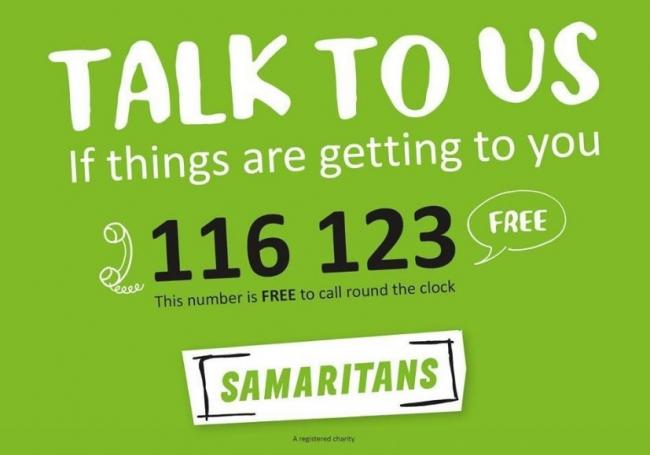
If you’re finding it hard to find the words, you might want to speak to someone who is trained to listen.
The helplines listed in this section can really help. You don’t have to be suicidal. You can talk to them about whatever’s getting to you, in your own way, and off the record.
Samaritans 116 123
Whatever problems you are facing Samaritans are there to listen 24/7
Papyrus Hopeline 0800 068 4141
Support and advice for Young People. 9am-Midnight every day.
SHOUT Text Shout to 85258
Crisis text service for support with any mental health concern 24/7
CALM Campaign Against Living Miserably 0800 58 58 58
Helpline for men of all ages 5pm – Midnight.
Young Minds Crisis Messenger Text YM to 85258
Crisis text support for under 25s 24/7
The Mix 0808 808 4994
Advice and support for under 25s 4-11pm
MindLine Cumbria – 0300 561 0000 text Mind to 81066
Information, guidance and support. Midday-11pm Mon-Fri. 5-11pm Weekends.
Childline 0800 11 11
Support currently available from 9am-Midnight and on line 1-2-1 chat
